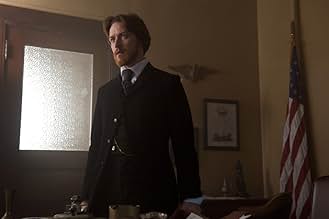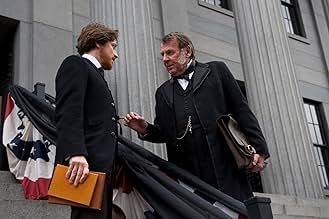Mary Surratt ist die einzige weibliche Angeklagte im Prozess um das Attentat auf Abraham Lincoln. Während sich die Nation gegen sie wendet, verlässt sie sich auf ihren Anwalt, um die Wahrhei... Alles lesenMary Surratt ist die einzige weibliche Angeklagte im Prozess um das Attentat auf Abraham Lincoln. Während sich die Nation gegen sie wendet, verlässt sie sich auf ihren Anwalt, um die Wahrheit aufzudecken und ihr Leben zu retten.Mary Surratt ist die einzige weibliche Angeklagte im Prozess um das Attentat auf Abraham Lincoln. Während sich die Nation gegen sie wendet, verlässt sie sich auf ihren Anwalt, um die Wahrheit aufzudecken und ihr Leben zu retten.
- Auszeichnungen
- 2 Gewinne & 3 Nominierungen insgesamt
Empfohlene Bewertungen
The film opens with some scenes from the Civil War battlefield where we meet the severely wounded soldier Frederick Aiken (James McAvoy) attempting to save the life of his buddy Nicholas Baker (Justin Long). The film then jumps to the end of the war when the Confederate generals have surrendered to the Union generals and parties are underway. Aiken and Baker have survived and Aiken has decided to pursue law. The President is assassinated by John Wilkes Booth and in the aftermath Booth is killed but it is discovered that there was a plot to kill Lincoln as well vice president Andrew Johnson (Dennis Clark) and secretary of state (Kevin Kline). The response of the nation is terror and the suspects of the conspiracy are arrested and set for trial. The conspirators had been meeting in the boarding house of Mary Surratt (Robin Wright) so the military decides she must also be a conspirator and tried with the others 'to put this madness to an end.' The men in charge of the tribunal include Joseph Holt (Danny Huston) and David Hunter (Colm Meaney). There is one lawyer, Reverdy Johnson (Tom Wilkinson) who feels that the tribunal is not an acceptable manner in which to try a citizen and assigns the fresh new lawyer Frederick Aiken to defend Mary Surratt. At first Aiken hates his role but as time passes and he gets to know Mary Surratt he is convinced of her innocence and implores Mary (and Mary's daughter Anna - Evan Rachel Wood) to reveal the location of the true problem in their family - Mary's son John (Johnny Simmons). The story features the change of approach of Aiken and the abuse of justice at the trial and the film ends with some very poignant lessons not only about our history but also about our present.
The pacing of the film is slow at times, but the cinematography by Newton Thomas Sigel and the musical score my Mark Isham keep the film involving. James McAvoy offers a sterling performance and the rest of the cast is impressive. THE CONSPIRATOR is a healthy dip into our nation's past and makes us more alert to our nation's present.
Grady Harp
After the assassination of Lincoln, we follow not so much the trials of the conspirators, but the trials of lawyer Frederick Aiken (James McAvoy). McAvoy has quickly forged an incredible career where he has a propensity to play the man next to historical figures and provide us with an inside view (like the doctor to Idi Amin in "The Last King of Scotland" or secretary to Leo Tolstoy in "The Last Station").
Here, McAvoy is the very patriotic soldier-turned-lawyer defending Mary Surrat (Robin Wright), the lone female conspirator. The film focuses only on Surrat's part of the trial of the conspirators, mostly because this film is about her lawyer. A devout supporter of Stanton and the Union, Aiken believed that Surrat was guilty and spent just as much time proving her guilt as her innocence. His internal struggles accepting everything that he had to do and what he should do were rather profound. I also think they make up McAvoy's best performance of his career. Too bad that the Academy will have forgotten it by the time the Oscars come around.
Like the best historical dramas, Redford never comes out and says if he believes that Surrat was innocent or guilty. "The Conspirator" isn't about that. This is about the trial. His views on the use of a military tribunal versus a civil trial are clear.
I was blown away by the impeccable production, the cast, and the sheer atrocities committed by so many of the characters not on trial. There may have been a few artistic licences taken, but I doubt it was with the extremes to which some military personnel will go. The great Kevin Kline and the up-and-coming Johnny Simmons play the two least sympathetic characters in the movie. Phenomenal casting is just one the great aspects of "The Conspirator".
Stealthily entering the President's box, Booth shoots Lincoln in the head, then leaps onto the stage shouting "sic semper tyrannis" (thus always to tyrants), and escapes on horseback. The assassination results in an outpouring of grief all over the country, and prompts the Secretary of War, Edwin Stanton (Kevin Kline) to vow revenge against the conspirators. After a two week search, Booth is found hiding in a nearby barn and shot to death, while seven suspected co-conspirators are arrested including Mary Suratt. Suratt is tried by a military tribunal where the rules state that only a majority vote is required for a guilty verdict and a two-thirds vote is needed to sentence a defendant to death. It is a court where a defendant is prohibited from testifying in their own defense.
Senator Reverdy Johnson (Tom Wilkinson) from Virginia and a former U. S. Attorney General agrees to defend Suratt on the grounds that she is innocent until proved guilty. The Senator, however, withdraws because he fears that being a Southerner might prejudice his case, and asks Frederick Aiken (James McEvoy), a northern attorney to defend her. Initially reluctant and dubious about her story, Aiken resolves to prove her innocence after seeing that the defendant was up against an overbearing prosecutor (Danny Huston), a biased head of the tribunal (Colm Meany), and the behind-the-scenes antagonism of Secretary Stanton.
At great cost to his personal life, Aiken tries to prove that Ms. Suratt knew the boarders who lived in her house, but was not involved in their conspiracy. As the case progresses, it becomes apparent that only her son John (Johnny Simmons), a known conspirator who fled to Canada, can save his mother by surrendering. While there is limited dimension to the characters, The Conspirator is true to the historical record and the film presents its message in a clear and powerful way. Redford, long a champion of civil liberties, implicitly reminds us that the Fifth Amendment to the U.S. Constitution expressly guarantees that "no person shall be deprived of life without due process of law" and provides no exception for war.
It is not only an important message for those unfamiliar with our nation's history, but is strikingly relevant to the present day in which hundreds of detainees at Guantanamo still languish in prison without trial, where a U.S. citizen, suspected of terrorist activities, is targeted for an assassination attempt without having been charged with, let alone convicted of, any crime, and where the ideal of due process and the presumption of innocence is slowly being replaced by unlimited violence, the repudiation of legality, and the undermining of democracy.
Wusstest du schon
- WissenswertesThe Surratt boarding house still stands in Washington, DC's Chinatown.
- PatzerWhen Booth is trapped and killed, he still has his distinctive mustache. He shaved his face soon after he killed Abraham Lincoln, to make himself less recognizable.
- Zitate
Edwin Stanton: Young man... always indebted to you for your courage in the field, but you must learn to tread lightly.
Frederick Aiken: Tread lightly? I will not tread lightly. You have predetermined her fate.
Edwin Stanton: Mary Surratt's fate rests entirely with the Commission. My concern is preserving our Union.
Frederick Aiken: Why did I fight for the Union if my rights aren't assured? You tell me.
Edwin Stanton: Fine words for rallying the troops, not for running a nation. They assassinated our president, and someone must be held accountable. The people want that.
Frederick Aiken: It's John Surratt you want. You don't even want Mary.
Edwin Stanton: I'll settle for either one.
- VerbindungenFeatured in The Conspirator: Mary Surratt and the Plot to Kill Lincoln (2011)
Top-Auswahl
Details
Box Office
- Budget
- 25.000.000 $ (geschätzt)
- Bruttoertrag in den USA und Kanada
- 11.538.204 $
- Eröffnungswochenende in den USA und in Kanada
- 3.506.602 $
- 17. Apr. 2011
- Weltweiter Bruttoertrag
- 15.625.544 $
- Laufzeit
- 2 Std. 2 Min.(122 min)
- Farbe
- Sound-Mix
- Seitenverhältnis
- 2.39 : 1































